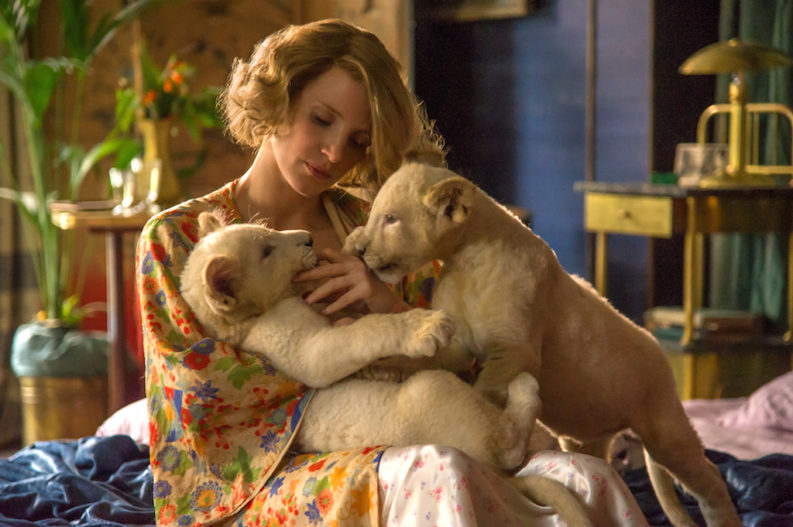Ursula, a bony 14-year-old girl, crouches against the farthest corner of the zoo cage, crossing her hands in front of her chest. After suffering abuse at the hands of two Nazi soldiers, the Jewish girl cannot speak. Her doe eyes speak only fear.
Antonina, the zookeeper’s wife, kneels near her, reassuring her and attending to the girl’s wounds. Antonina had converted her husband’s zoo into a safe house for Jewish people during the Nazi occupation of Poland. Ursula is one of the hundreds of Jewish people who hides in the animal cages until Antonina and her husband can send them somewhere safer.
Played by Jessica Chastain, Antonina is an unlikely heroine for a Holocaust film. Uncomfortable with humans but gifted with animals, Antonina has a tenderness that masks her strength.
Niki Caro, the film’s director, was “inspired by Antonina’s courage and her care and her compassion, because she sheltered Jews at great risk to herself and her family, for no other reason than it was the right thing to do,” Caro said to The Miami Hurricane in a group press interview.
The young girl remains frozen from the shock, so Antonina hands her a bunny – one of the last surviving animals after the Nazis slaughtered the Warsaw Zoo’s prized animals. The scared girl lets her guard down, replicating the tenderness that Antonina displays toward the bunny. As the bunny caresses her battered neck, there was a moment of hope. Ursula’s discreet smile shows that even immense hurt can give way to healing.
Though the script was already written when it came into her hands, Caro worked to develop it, paying particular attention to the female characters. Caro said she was drawn to the script’s true story “because war is experienced by everybody. It’s not just experienced by men … Women, children and animals experience war also.”
Caro added the character of Ursula because she wanted “a child emblematic of all children who suffer so much in war.” The way Antonina cares for the child is similar to how she cares for the baby elephants of the zoo: with tenderness, with worry.
Part of what made the film special was that “the animals would be so calm with Chastain and she with them,” Caro said. “And there was this just wonderful trust and communication between her and the animals.”
Caro said cannot imagine any other actress connecting so much with the animals in the film, dubbing Chastain a “genuine animal whisperer.”
Caro said she was also attracted to the story’s message of hope.
“Antonina used her gift to tend to these damaged Holocaust survivors and created an environment for them that was made bearable with art and music and tenderness and understanding,” she said.
Indeed, the film captures charming moments as symbolized by the joy of Antonina’s piano, the sweetness of the animals and the innocence of children’s drawings. Yet these soft moments do not take away from the reality of the war story, merely heightening it.
“The Zookeeper’s Wife” is now playing in theaters. Tickets at AMC Sunset Place can be bought online for $10.69 for adults and $9.09 for seniors and children.
Rating: 4/5 stars






